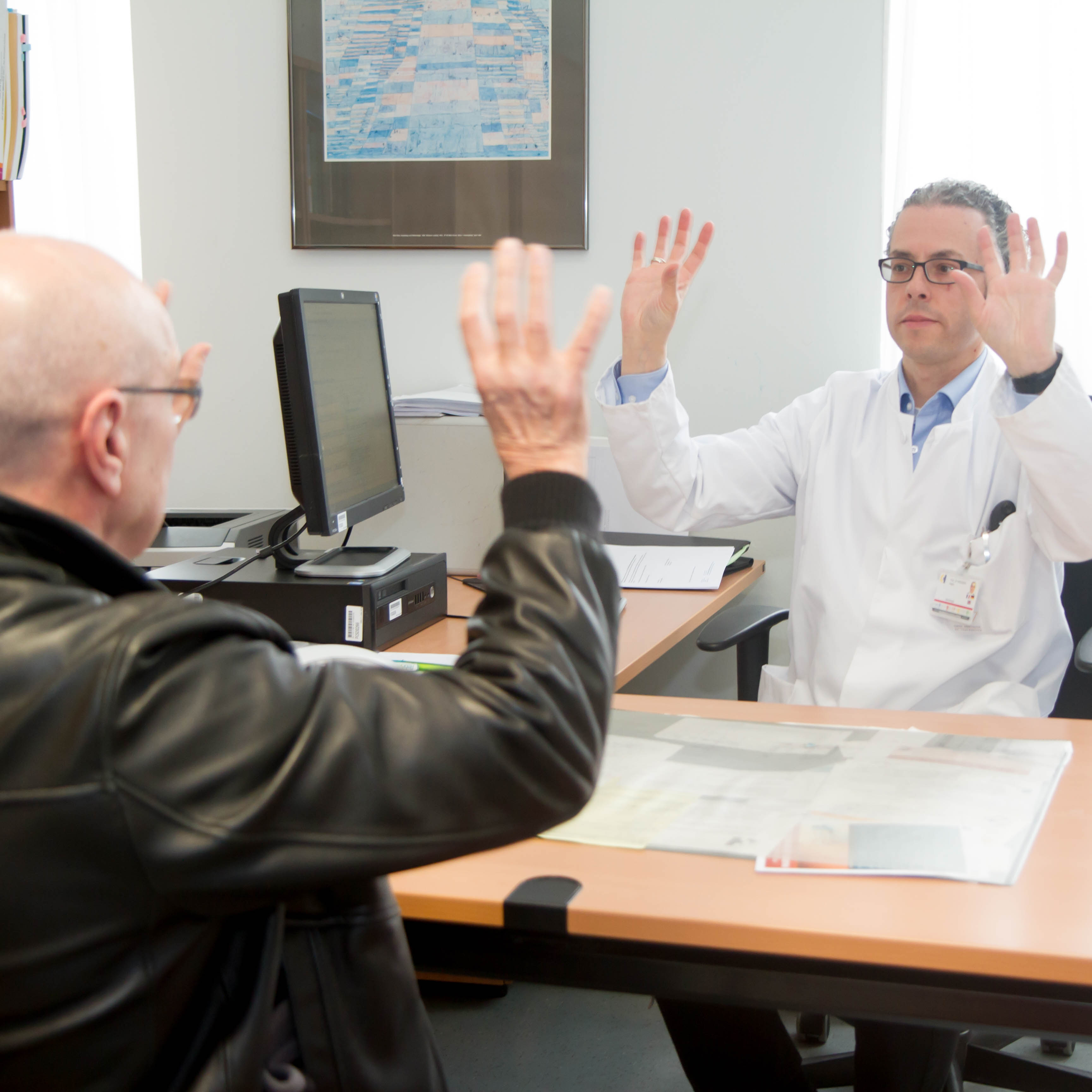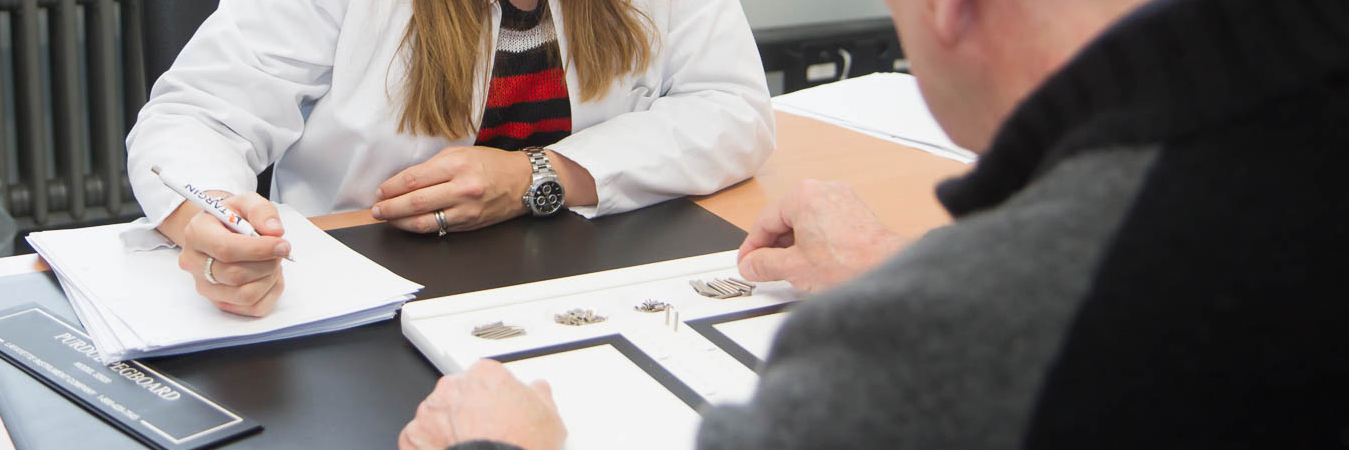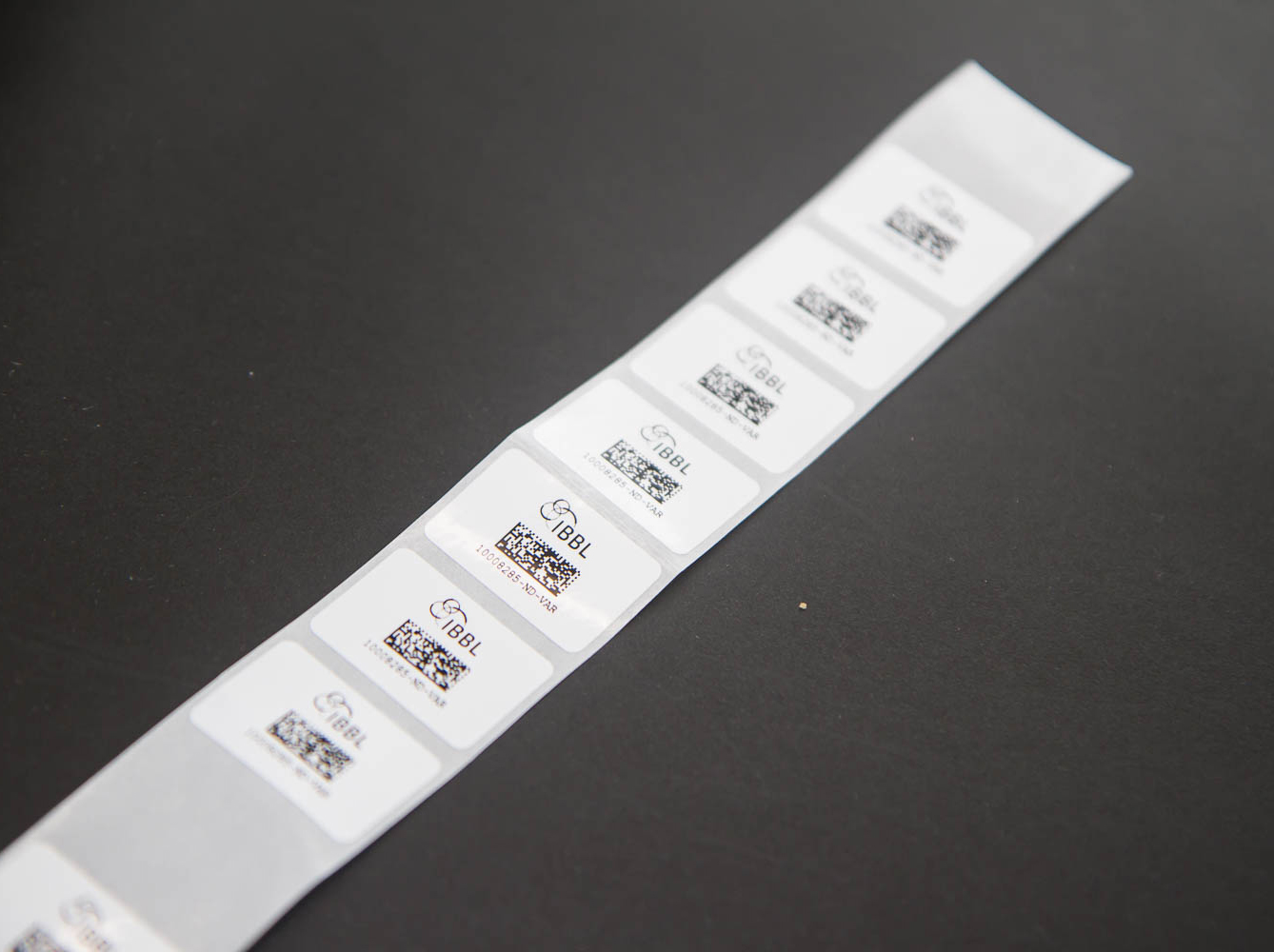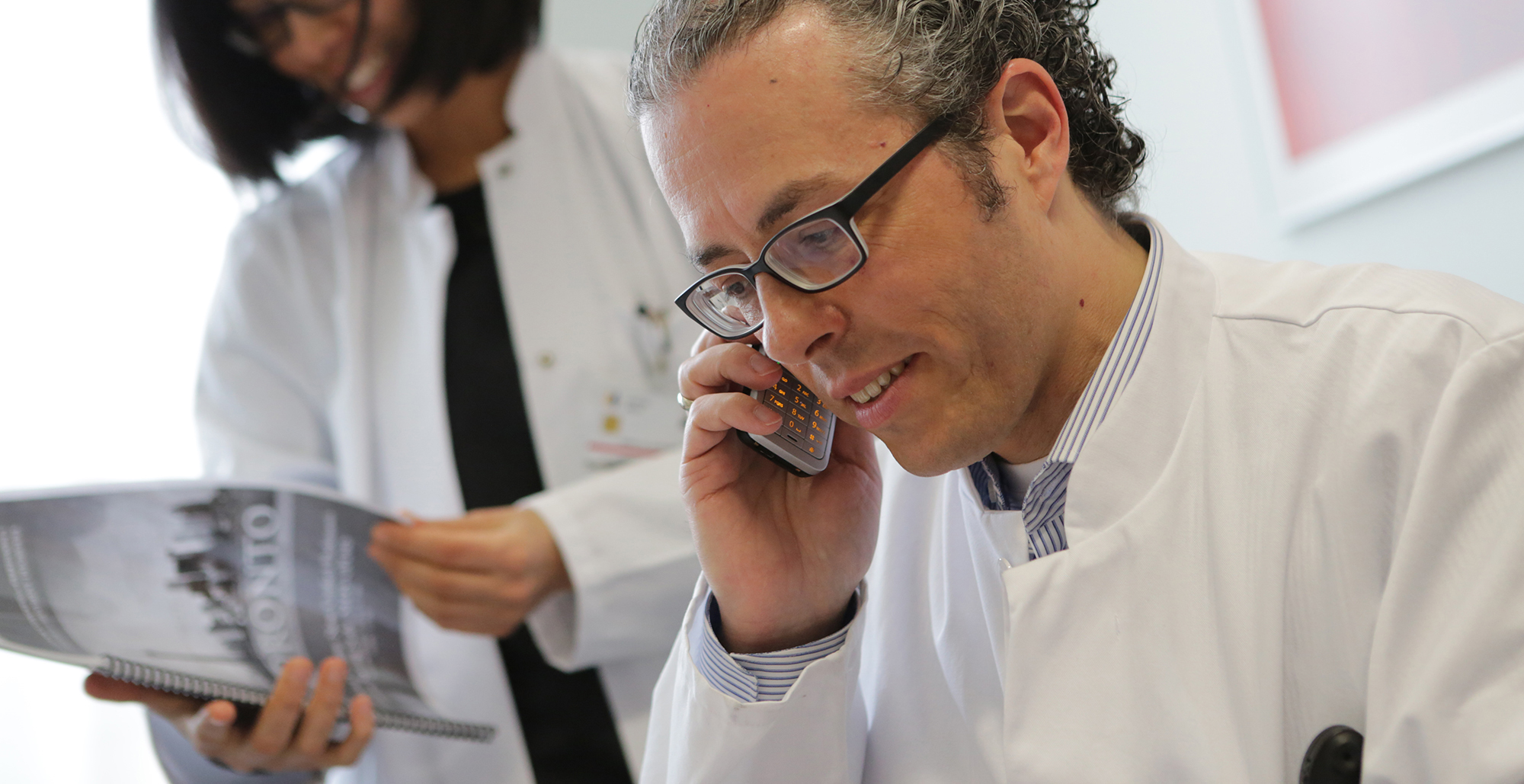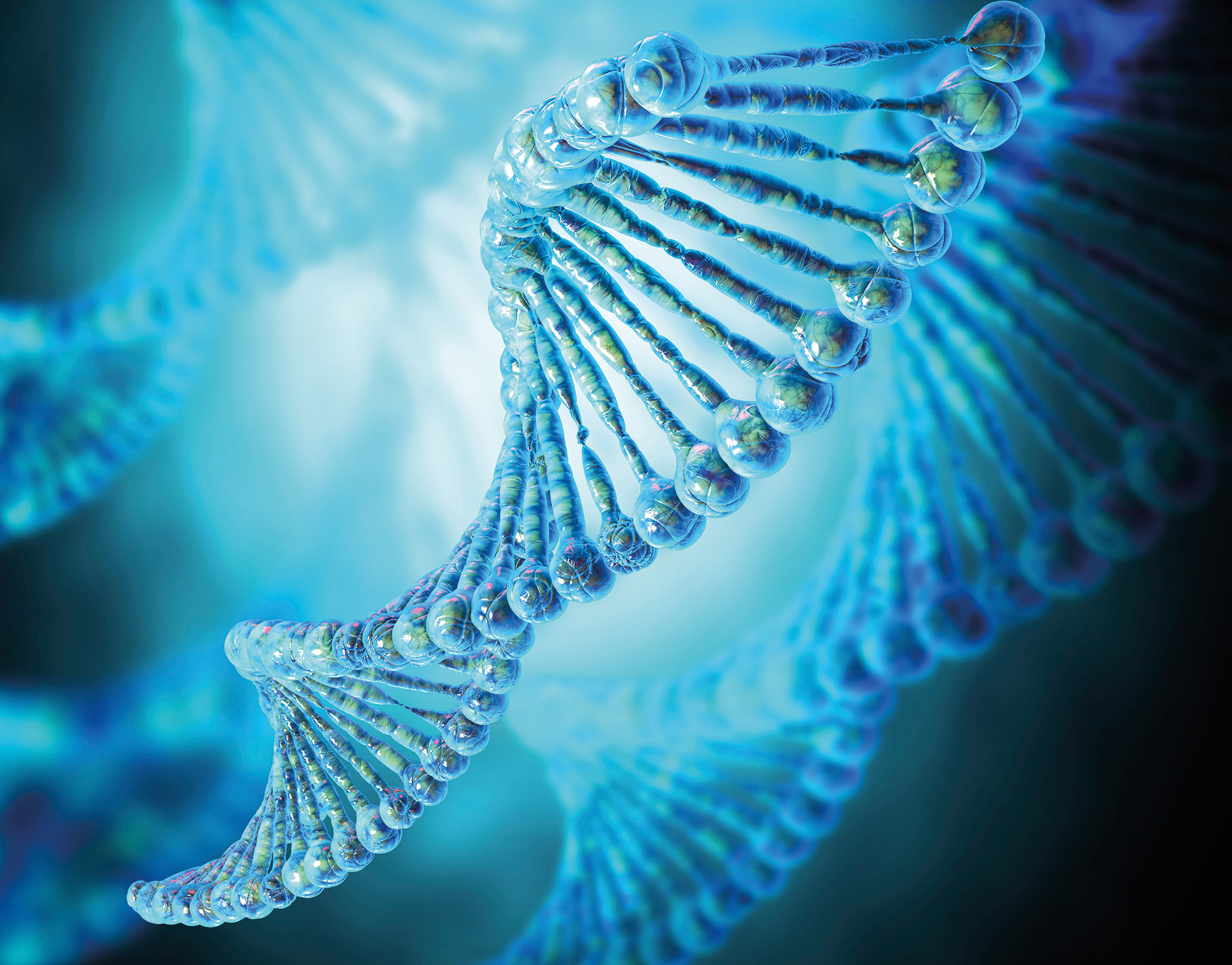What happens during a visit? Which examinations can I expect?
If you are interested in joining the study and want to know more about what kind of examination you can expect during a visit, you can talk to your doctor or call us directly. The reception desk is open on weekdays from 08:00 to 16:30 and our secretaries can give you more information about the study and schedule an appointment with you. The appointment will take place when it suits you best.
After the phone call, you will receive a letter containing the confirmation of your appointment, instructions on how to get to our premises, as well as several questionnaires to fill in at home. The questionnaires are about the motor and non-motor symptoms of Parkinson’s disease. The purpose of the questionnaires is to gather more information about your personal situation. Filling out these questionnaires for the first visit will take a bit longer than in the follow-up visits because we want to know more about your family’s medical history.
You will see a nurse during your visit. For our research, we ask you to donate blood, saliva and urine. The nurse will do the sampling and takes anthropometric measurements (weight, height, waist and hip circumference, blood pressure). You do not need to have fasted before the blood sampling and you can take your medication as usual.
You will have a neurological examination where the neurologist will ask you about your medication, medical history, symptoms, daily life activities, sleeping habits etc. Please bring a list of your medication with you. If you have any imaging files of your brain or have had any other examinations done for your diagnostic, please bring them with you as well. If you are a control subject, you will see the neurologist during your first visit in order to exclude a parkinsonian syndrome.
Besides the neurological examination, you will also do neuropsychological tests with our neuropsychologist. Here, we test the motion of your hands, your attention, your memory, your concentration, language and sense of smell.
Participating in our study only concerns research, not treatment. We will not prescribe or offer you any medication nor do we change the therapy prescribed by your treating physician.
How long does it take?
If you are a person with Parkinson’s disease, the visit usually takes approximately 3 hours. The length of the visit depends on your needs. It is also possible to split it into two days if 3 consecutive hours is too tiring.
If you are a control person, the visit usually takes approximately 2 hours.
If for any (health) reason, it is not possible for you to come to the clinic, we can offer you other options but this is only possible for follow-up visits. Please call our secretary to see what the possibilities are.
Donating samples for our research
Besides the regular sampling (blood, saliva and urine) done during the visit, you can support our Parkinson’s disease research by donating other samples. If you agree to donate specimens, they will be collected and stored at the IBBL (Integrated BioBank of Luxembourg), until used for further analysis.
Stool sample
You will be given a kit for stool sampling to take home with you, and the nurse will explain to you how to use it. The sample is to be sent to the laboratory at the IBBL by post. More than two thousand different species of bacteria live in our gut. They are partly excreted through our stool. To test the hypothesis that the composition of bacteria in the gut may contribute to Parkinson's disease (either by causing the disease, by increasing/diminishing its progression, or by altering the function of the medications), our researchers are investigating whether different types of bacteria are found in patients and control subjects. To this end, they genetically test the stool sample to identify the different species of bacteria, their amounts and functions.
Skin biopsy
We will perform a biopsy by removing a small superficial portion (1mm depth) of the skin on your back (lumbar area). This happens under local anaesthesia and it takes less than 5 minutes. Only a small superficial wound, comparable to a small graze, remains. We will treat it with an adhesive strip, such that it heals within a few days. From your skin cells, we can establish a cell culture in the laboratory, from which we can recreate first stem cells and then nerve cells (neurons). These are particularly well suited for research on Parkinson's disease, for example to investigate the influence of genetic risk factors.
Analysis of cerebrospinal fluid
Patients can also donate cerebrospinal fluid on a voluntary basis. Cerebrospinal fluid is a clear fluid derived from blood plasma that surround the brain and spinal cord, protecting them and providing nutrients. It can be collected via lumbar puncture. A neurologist from our team will describe the process to you beforehand: a needle is introduced between two vertebra in the lumbar spine. Through this needle, a few millilitres of cerebrospinal fluid can be collected.
As this does not cause pain, you will not be anaesthetised. However, a sensation of discomfort may be present during the exam. After the exam, a headache may appear which lasts 30 minutes maximum. Afterwards, you can stay and rest in the clinic until you feel well enough to continue your day.
Our researchers will examine the metabolic products in the cerebrospinal fluid in detail and compare them between patients and healthy controls. Since the cerebrospinal fluid is in contact with the brain, they can draw conclusions about metabolic changes in the brain from these analyses.
Will I be contacted in the future to ask for further information?
We may contact you at a later stage of our research. Researchers make new scientific discoveries each day. Thus, it is important to collect additional information about the health or lifestyle of participants that were not considered to be of importance when the collection was designed. If you agree to be contacted in the future, we shall contact you by e-mail for new scientific questions no more than once every 6 months.
- Videos on Parkinson's disease
- Myths about Parkinson's disease
- Fact sheets
- Biannual newsletter
- Stories from Parkinson's Fighters





